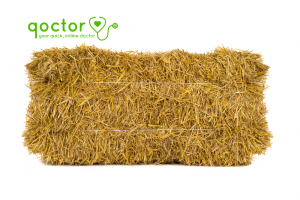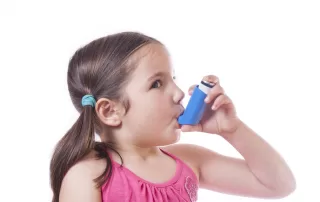The Hay Fever Hub
Welcome to Qoctor’s online doctor service which can provide assessment for Hay Fever. Answer some online questions, then book a video consultation with an AHPRA-registered doctor. The consultation fee is $29.99.
If a prescription is advised, it can be sent as an eScript to your phone OR electronically to your local pharmacy. Repeats available (subject to assessment). Alternatively you can have medication delivered by an Australian partner pharmacy- in this case, the cost of medication is added at the checkout. All treatment and advice is issued subject to your doctor’s assessment.
About Hay Fever
Hay fever is also known as allergic rhinitis.
It is most commonly caused by an allergy to pollen released by grasses, trees and flowers.
Some people get symptoms all year round from house dust-mites, moulds or dusts/chemicals.
The immune system over-reacts to these air-borne particles, leading to runny nose, sneezing, itchy eyes and other symptoms.
Symptoms vary from person to person and include:
- a runny or blocked nose
- sneezing
- itchy watery eyes
- itchy throat
- tiredness
- asthma-like symptoms, like coughing and wheezing

FAQs – hay fever symptoms & hay fever medication
If you have asthma or hay fever you may be at risk of thunderstorm asthma- particularly in spring and summer. Thunderstorm asthma can be very dangerous, leading to severe difficulty breathing. It can be life-threatening, even in people who do not usually get asthma. If you have asthma or hay fever, you should speak to your doctor about how to protect yourself, in advance of thunderstorm season.
What causes Thunderstorm Asthma?
It is thought that thunderstorm asthma events are triggered by a combination of high grass pollen levels in the air and a certain type of thunderstorm. Pollen grains get swept up and carried long distances. Pollen grains can burst apart in these conditions, releasing tiny particles that can get deep into a person’s airways, triggering asthma symptoms.
Some steps to take to protect yourself against Thunderstorm Asthma:
- Make sure your asthma is properly controlled (see below). If it is not, speak to your doctor. You can also take an Asthma Control Test , available on the Asthma Australia website – and see your doctor urgently if your score is under 20.
- Discuss treatment of asthma and hay fever regularly with your doctor, particularly if you have symptoms or if there is high risk weather coming. Have an asthma action plan.
- Use your asthma preventer inhaler every day during high risk weather, even when well.
- Carry an asthma reliever puffer with you at all times
- If you have hay fever, use a steroid nasal spray every day when the pollen count is high.
- Follow your local weather forecast for warnings about high thunderstorm asthma risk levels (For VIC, NSW, ACT and QLD go HERE to monitor the pollen forecast, and for TAS go HERE).
- Stay indoors with windows shut on days the pollen count or thunderstorm asthma risk is known to be high.
See a doctor immediately or call Triple Zero (000) if you experience difficulty breathing.
Signs of Good Asthma Control
Asthma is well controlled if :
- most days, you don’t have any breathing difficulties, cough or wheeze.
- you generally sleep through the night, without waking due to asthma symptoms like cough, wheeze, or chest tightness
- you can exercise without getting asthma symptoms (some people need to use their reliever beforehand, to achieve this)
- you don’t miss work or school due to asthma
- you do not need to use your reliever inhaler more than 2 times per week (except for exercise)
Asthma control can also be checked by having a breathing test (spirometry).
Hay fever (also known as seasonal allergic rhinitis) is caused by an allergy to pollen. Pollen particles are released into the air by flowers, grasses and trees, particularly in Spring and Summer- causing runny nose, sneezing and itchiness of the throat, eyes and ears. It can be severe in some cases, with bouts of repeated sneezing, a constantly streaming nose and inflamed eyes. On a bad day, it can be almost impossible to work, study or socialise. Some people get hay fever symptoms all year round, from dust, moulds or animal hair/dander.
Hayfever happens when a person’s own IgE antibodies attach to an allergen ( i.e. pollen, dust, animal dander or whatever the trigger is for that individual), leading to the release of inflammatory chemicals such as histamine– which in turn cause the tell-tale hay fever symptoms.
- Usually not. In nearly all cases, diagnosis is obvious based on the typical hay fever symptoms, and the fact that these symptoms get better when the trigger is avoided and/or a trial of hay fever medication works.
- Whilst there are skin prick tests and blood tests available, they are not often performed, as they often show false positives, which can be misleading.
- However, if your hay fever symptoms are severe, sometimes your GP or respiratory specialist may feel it’s worth getting such tests done.
- There is no single most effective type of hay fever medication – it varies from person to person.
- Some people find a once daily antihistamine tablet controls symptoms very well.
- However, quite often, drowsiness can be a problem with antihistamines, even the supposedly “non-drowsy” ones.
- Other types of hay fever medication such as steroid nasal sprays can be very helpful for an itchy and runny nose- these take a few weeks of regular use to build up their effect, so it’s important to persist.
- Combination nasal sprays may contain a fast-acting antihistamine and a slower-acting steroid. Even though they may be more pricey than other nasal sprays, the dual action makes it a very popular choice among patients.
- Antihistamine eye drops can effectively target the irritated itchy eyes of hay fever
At peak times it can be hard to avoid pollen, but here are a few sensible tips:
- If possible, try to stay indoors until after midday, particularly when the pollen count is high and on windy days
- Stay indoors during and just after thunderstorms, particularly if pollen counts are high. Information about pollen counts is available at pollenforecast.com.au
- If possible, get someone else to mow your lawn (if you must do it, wear a mask and take an antihistamine beforehand) and stay inside if it’s being mown.
- Keep windows closed both at home and in the car (use recirculating air conditioning in your car if you have it)
- Wear sunglasses when outdoors
- If landscaping your garden select plants that are less likely to trigger hayfever, and make sure none of the more troublesome types are growing near your bedroom window!
- Shower when you get home/after being outdoors
It’s not certain why hay fever happens. But it does seem that there’s a lower risk in people who are exposed to animals early in life, people who grow up on a farm, or those who have lots of brothers and sisters!
- For most people it’s about managing symptoms of hayfever (allergic rhinitis) and avoiding triggers.
- If you’ve got severe allergic rhinitis, it is possible to get a course of immunotherapy via an allergy specialist.
- Immunotherapy involves getting regular injections which, over 3-5 years, may result in desensitisation to the trigger- i.e. a cure, though it does not work for everyone.
Steroid injections used to be given for hayfever. Doctors no longer recommend this option because of the significant side effects of steroid use, and the fact that there are now many other effective, safer hay fever medications available.
Health Library- Hay Fever & hay fever medication
Hay fever (also known as seasonal allergic rhinitis) is caused by an allergy to pollen. Pollen particles are released into the air by flowers, grasses and trees, particularly in Spring and Summer- causing runny nose, sneezing, itchy eyes and throat. Qoctor can provide prescriptions for a wide range of hay fever medication: steroid nasal sprays such as Avamys and Omnaris, combination nasal sprays like Dymista, eye drops and the oral medication Montelukast (Singulair).
People with hay fever (allergic rhinitis) may also be at risk for thunderstorm asthma- if you live in Victoria you can now get thunderstorm asthma warnings via an app. And if you want to know more about getting an asthma action plan just in case, click here.
Food allergies in Australian children- what you need to know
Food allergies in Australian children- what you need to know Food allergies are on the rise in Australia, affecting 5-10% of children. Understanding allergies, recognising the symptoms, and knowing how to respond can help parents to feel less stressed about their child's condition, and manage the risks more effectively. Book a GP appointment Common allergens There are over 170 known food triggers for allergies. The most frequent triggers of food allergies in children include: Eggs Cow's milk Peanuts Tree nuts (such as almonds and cashews) Sesame Soy Wheat Fish and shellfish These allergens account for the majority of allergic reactions in children, with peanuts, tree nuts, and seafood often resulting in lifelong allergies. Many children outgrow allergies to dairy products and eggs. Symptoms to watch for Food allergy symptoms can vary widely [...]
Mould- a cause of asthma and allergies
Is your home causing Asthma? Overview Our homes are not just a roof over our heads- they play a key role in our health, particularly when it comes to allergies and asthma. A study carried out by Asthma Australia in 2022 showed that almost one third of people with asthma or allergies find their symptoms get worse when they are at home, regardless of whether they are owners or renters! We all want a safe and healthy place to live- so, as an asthma or allergy sufferer, what are some of the key things to check in your house? Request a prescription Cooktops & rangehoods Gas cooktops are often preferred by home cooks, but they are linked with poor health, as the burning of gas releases many nasty substances that cause [...]
Why request an Asthma Action Plan?
Why request an Asthma Action Plan? What is an asthma action plan? A key part of asthma management is the preparation of a written asthma action plan by the person with asthma and/or their carer, together with their doctor. An asthma action plan is a document that helps the person with asthma and those who care for them, to recognise worsening asthma symptoms and to take the correct steps to safely manage them. REQUEST AN ASTHMA ACTION PLAN What information is contained in an asthma action plan? Factors that make your asthma worse (triggers). Medicines you take to treat your asthma, with the names of each medicine/inhaler Symptoms and/or peak flow measurements that indicate worsening asthma Which medicines/inhalers to take based on symptoms or peak flow measurements Symptoms that indicate a need for [...]



